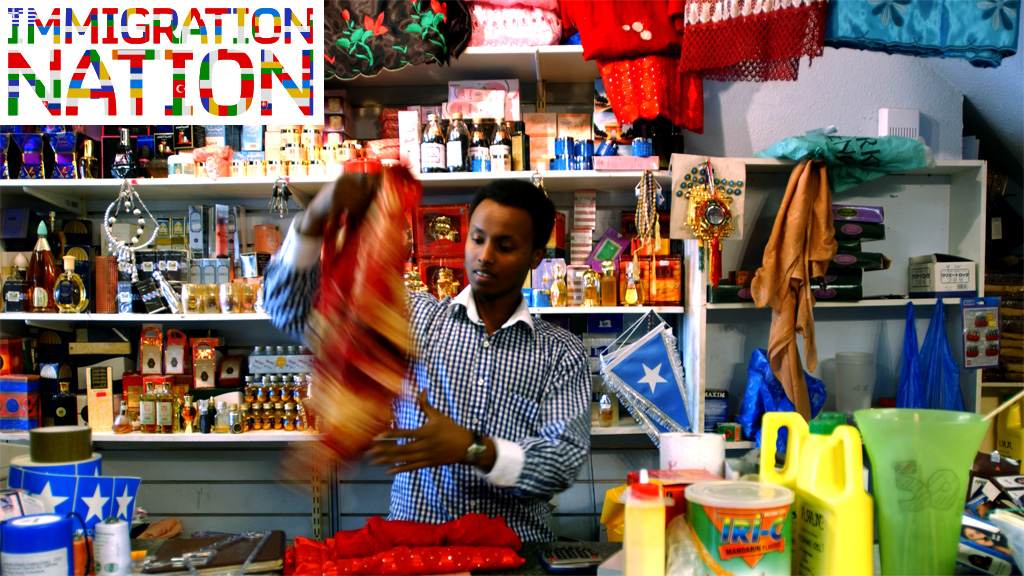Immigration Nation: one man’s journey from Somalia
 Jamal Osman
Africa Correspondent
Jamal Osman
Africa Correspondent
Politicians often blame immigrants for not doing enough to integrate into society. But do they know what integration means? Jamal Osman shares his experience of moving to London from Somalia.
Is integration about mixing with the Brits or speaking the Queen’s English? Is it about dressing in certain ways, eating certain food, listening to British music?
In my experience, integration has different connotations for different people. And in my 14 years of living in this country, my interpretation of it has been changing.
At first, I thought integration was about going down the pub and having a pint, which I couldn’t do for religious reasons. Then I developed an obsession with the weather but found it difficult to continue talking about it. Later, I became addicted to eating fish and chips but soon got tired of it.
Today, after all those years, I don’t really know what it means to be integrated.
Who knows where I would be?
I came to this country from Somalia in my early 20s with no family and very little English. It took me two years to be comfortable with life in London: when I got my refugee status and started working full-time.
I became more confident using phrases like, “innit”, “you know what I mean”, and so on.
Like many other immigrants, I appreciate the opportunity this country has given me to better myself and to achieve something in life. The compassionate immigration system allowed me to have the same rights (in most cases) as everyone else.
The generous welfare enabled me to get assistance when I needed it. The high-quality British education improved my knowledge of the world and helped me realise my aspirations.
Who knows where I would be had I not come here.
Read more coverage of our Immigration Nation report
Giving back
Most immigrants will probably say the same. And in return, we make positive contributions to the British society: whether it is great ideas, a hard-working ethic, delicious food and so on. It is a two-way relationship.
How many of you dine at Chinese, Indian and Italian restaurants? How many of you call affordable Polish builders when you want housework done? How many of you take an immigrant cab driver at weekends? What about the NHS workers who care for you in your hour of need?
Surely, Britain would be a poorer place without us, immigrants.
And, in my experience, the UK attracts foreigners because it is the best country in Europe to be an immigrant – in particular, living in London, where you are surrounded by people from all over the world. That doesn’t make someone feel like an outsider, but just another member of a global community.

‘Integration about contribution’
I met Marek and Magda, who moved from Poland in 2004.
Both of them work for a small coffee chain they started with when they came over here. Marek progressed from the warehouse to a marketing manager, while Magda juggles between looking after their two sons and doing a shift in a coffee shop.
For them integration is not about who you are but how much you contribute to the society.
In Brighton, Mau and Mini came from a completely different part of the world. Due to a nursing shortage in the NHS, Mini was among the dozens recruited from the Philippines in 2001. Her husband Mau followed her few months later and now works as an IT manager.
Safe haven
Others came seeking a safe haven. Fleeing the Somali civil war, Amal was just a one-year-old when her mother arrived in 1991 with her older brother.
Her mother encouraged them to be good citizens and to make positive contributions.
For immigrants, integration means being a decent human being and working hard.
What British politicians should do is to admit their failed policies and broken promises rather than accusing immigrants for wrongdoings. All we are here to do, is to have a better life, and in the process contribute to the society.
We are not here to give up our own identities and cultures. Why should we? I can be a Somali living in this country.
I am not going to socialise in a local pub when I can find a nearby Somalian cafe.
I will do what I feel comfortable with. And I am sure most immigrants will do the same.